|
MOKANCAN had another great meetup on 10/29/2023 at Lawrence Public Library in Lawrence, KS! Here is a list of what we discussed along with relevant links: Matt from the Lawrence Linux Users Group told the group about Apache Guacamole. Apache Guacamole is a clientless remote desktop gateway. It supports standard protocols like VNC, RDP, and SSH. Thanks to HTML5, once Guacamole is installed on a server, all you need to access your desktops is a web browser. Ray from MOKANCAN talked about how the organization will have a table at the Lawrence, KS Anarchist Bookfair coming up on December 2nd. This will be MOKANCAN's first time tabling at an event. The Anarchist Bookfair starts at noon and will be taking place at Ecumenical Campus Ministries on the University of Kansas campus. The group discussed the recent ransomware attacks on the Kansas court system. While details are still not quite clear, it appears that there was an "unauthorized incursion" into a brand-new statewide computer system and affected all Kansas state courts. Another member of MOKANCAN talked to the group about the newest release of Krita. Krita is a full-featured free digital painting studio for artists who want to create professional work from start to end. Krita is used by comic book artists, illustrators, concept artists, matte and texture painters and in the digital VFX industry. Krita is used by millions of people all over the world. Some of the other topics discussed during the meetup were Flipper Zero now being able to spam Android and Windows users with Bluetooth alerts, HackerOne paying ethical hackers over $300 million in bug bounties, scammers preying on social security beneficiaries by sending out letters claiming to be the Jackson County Housing Authority and telling the beneficiaries that they needed to upload social security numbers, and other personal information, to a fraudulent website, Shodan.io, and KDE Plasma Vaults.
Thank you to everyone that showed up for the meetup! Our next meetup will be on Sunday November 26, 2023 from 2pm-4pm @ Lawrence Public Library Meeting Room C. There will be an Anarchist Bookfair in Lawrence, Kansas on December 2, 2023! MOKANCAN will have a table there with handouts, stickers, and hopefully some other fun swag! The event starts at noon and will be held at the Ecumenical Campus Ministries building (1204 Oread Ave.) on the University of Kansas campus. We hope to see you there!
LFP Webinar: Privacy and Security for Reproductive Information Seeking from Library Freedom Project on Vimeo. Slides: https://docs.google.com/presentation/d/1bEcPrDnpcvuPnreizo-B2y9wsR2M5VzV/edit?usp=sharing&ouid=112092717358099226213&rtpof=true&sd=true Disappointing turnout at today's MOKANCAN meetup, but that's to be expected given that Taylor Swift is at the Chiefs game today. We have some rockin' new handouts though. Even some en español! Visit us next month Oct 29th from 2pm-4pm in Meeting Room C at Lawrence Public Library!
In recent times, we have witnessed a troubling trend in American politics - the use of book burning as a form of political theater. This disturbing act, symbolizing support for book bans sweeping across the United States, not only undermines creativity and access to knowledge but also threatens our fundamental principles of free expression. The participation of Missouri State Senators Bill Eigel and Nick Schroer in such an event is a deeply troubling development that warrants a strong opposition. Free expression is a cornerstone of American democracy. Book burning, as a symbolic act of censorship, directly contradicts this principle. When elected officials engage in such behavior, they send a dangerous message that it is acceptable to stifle diverse viewpoints and ideas. This narrow-minded approach threatens the very foundation of progress and intellectual growth upon which our society is built.
Censorship, in any form, stifles creativity and innovation. Books are a medium through which ideas, stories, and knowledge are shared. When we ban books or engage in book burning, we limit the diversity of thought and perspectives that fuel creativity. This hampers our ability to explore different viewpoints and engage with diverse cultures, which are essential for fostering creativity. Book bans and burnings harm access to knowledge and information. They deny individuals the opportunity to educate themselves about important issues, limiting personal growth and the ability to make informed decisions as citizens. By restricting access to information, we hinder the development of an informed and engaged society. Engaging in book burning as a form of political theater sets a dangerous precedent. When elected officials endorse censorship, it emboldens others to follow suit. What might start as a symbolic act can quickly escalate into genuine threats to free expression and the suppression of ideas that don't align with those in power. In a democracy, we resolve differences through civil discourse, not by burning books. When elected officials resort to such extreme measures to make a political point, it undermines the possibility of constructive dialogue and compromise. It promotes division and polarization, further eroding the foundations of our democracy. The participation of Missouri State Senators Bill Eigel and Nick Schroer in a book burning event is a deeply troubling and dangerous form of political theater. It not only undermines the principles of free expression but also stifles creativity, restricts access to knowledge, and sets a perilous precedent for future actions that threaten our democracy. As citizens, we must uphold the values that make our society strong, and that includes standing up against any attempt to suppress the free exchange of ideas and information. In the vast landscape of online communities, subreddit r/Lawrence stands as a prominent hub for the residents of Lawrence, Kansas. While its rules clearly state that advertising is prohibited, they do extend a welcoming hand to free events of interest to the local community. In the realm of online moderation, decisions are often made in black and white terms, but there are instances when a more nuanced approach should be considered. The ban on u/MOKANCAN for promoting an grassroots organization's meetup highlights the complexities of moderation in the digital age, where the line between advertising and community-building can blur. Community rules and guidelines are the backbone of any online forum. They serve as a set of principles that govern the behavior and content within a community, fostering a safe and engaging environment for users. In the case of r/Lawrence, their rules are clear – advertising is not allowed. However, they do carve out an exception for free events relevant to the local population, recognizing the value of community-building activities.
Our predicament sheds light on the inherent challenges moderators face when enforcing community rules. On one hand, our post did contain elements of promotion – it was about a meetup organized by our group. On the other hand, it was a free event that aligned with the subreddit's focus on local interests. The ban, while technically in line with the rules, raises questions about whether a more flexible interpretation should have been considered. At the very least, a warning should have been given instead of an outright permanent ban. The world of online moderation is not just about following a rigid set of rules; it also involves discernment and judgment. In many instances, situations don't neatly fit into predefined categories. The ban on u/MOKANCAN's post illustrates the need for moderators to navigate this gray area. Here are a few reasons why moderation should not always be black and white: Intent Matters: Moderators should consider the intent behind a post. Was it genuinely meant to promote a commercial product, or was it an attempt to enrich the community through a free, relevant event? In our case, the latter is true. Community Benefit: The primary goal of any subreddit should be to serve its community. If a post benefits the local residents and aligns with the subreddit's interests, a case can be made for leniency. Flexibility and Adaptability: As online communities evolve, so do their dynamics and interests. Moderators should be open to adapting their rules and interpretations to reflect these changes. The case of u/MOKANCAN and r/Lawrence highlights the importance of moderation's gray area. While rules are essential, a rigid approach can stifle community growth and discourage genuine engagement. In situations where intent is genuine and community benefit is clear, moderators should consider a more flexible approach. As we navigate the ever-evolving landscape of online communities, moderation should strive to strike a balance between enforcing rules and nurturing community spirit. |
About UsThe Missouri and Kansas Cyber Alliance Network promotes free expression, security, privacy, creativity, and access to knowledge in the Sunflower and Show Me states. |





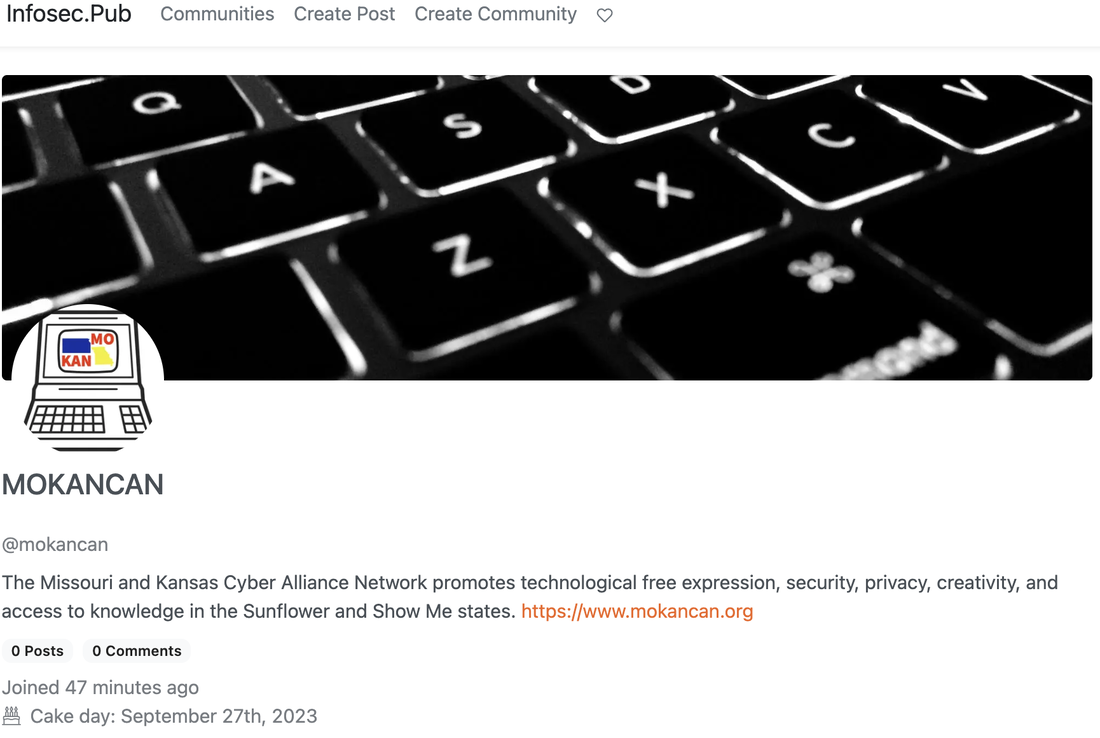
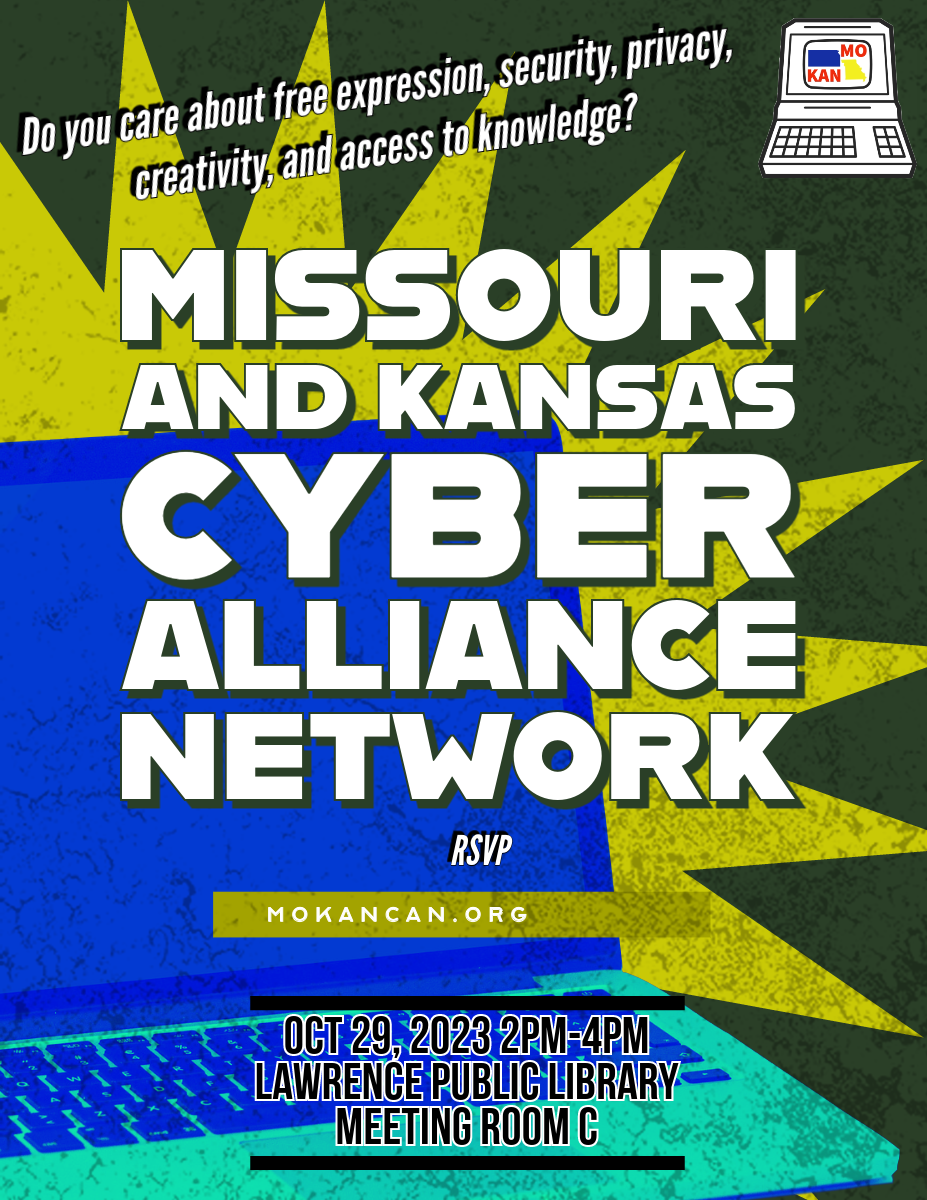
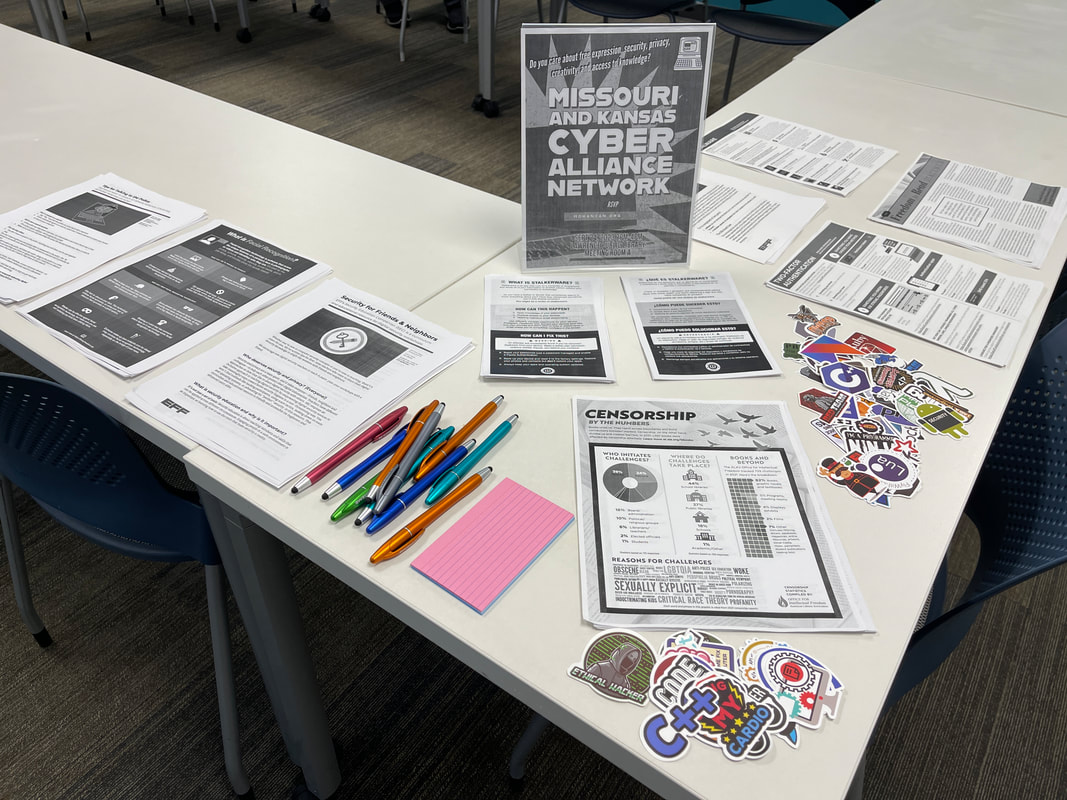

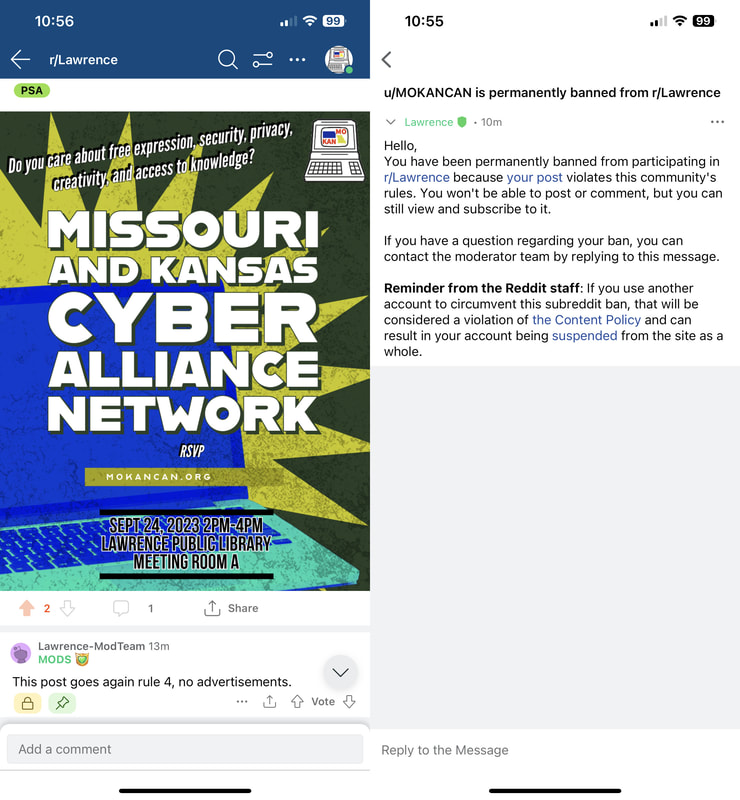
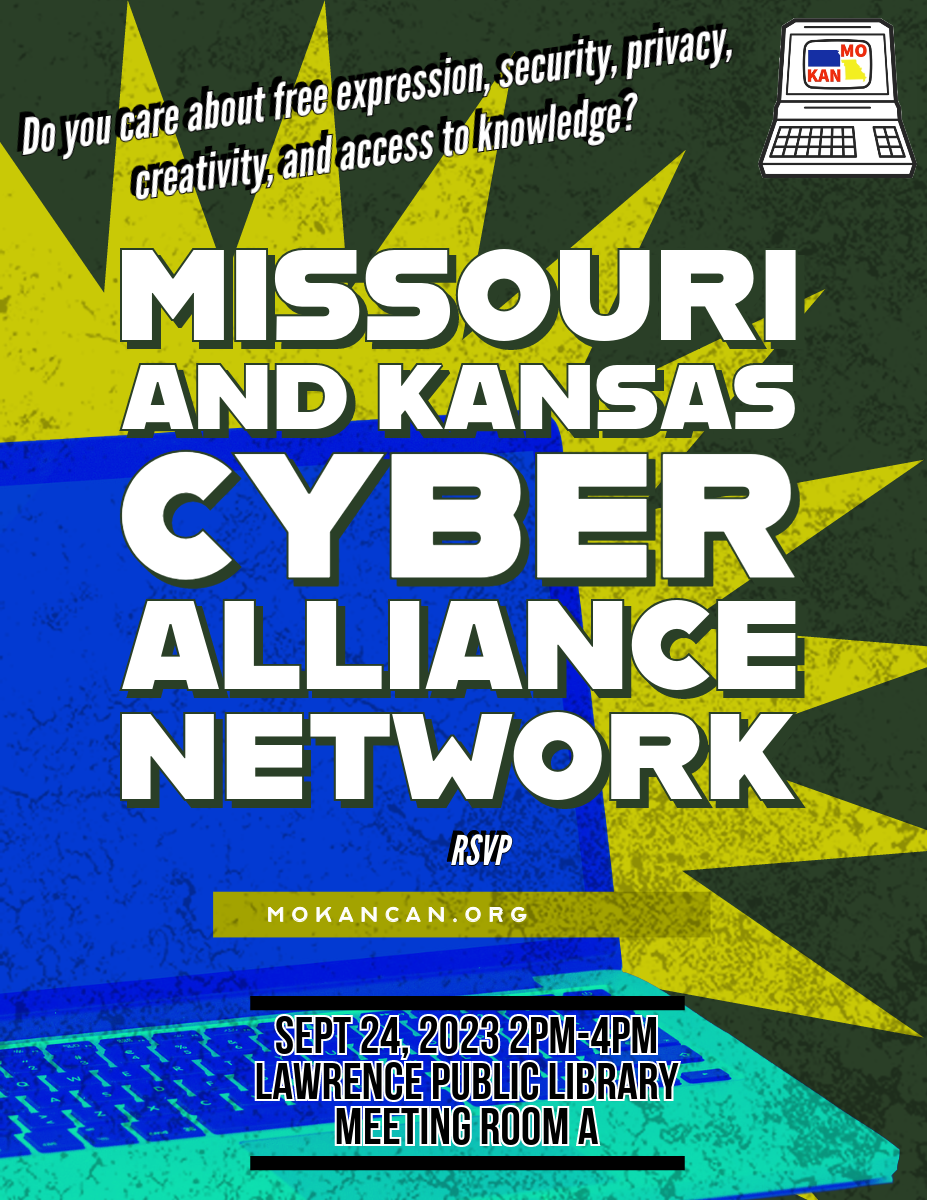

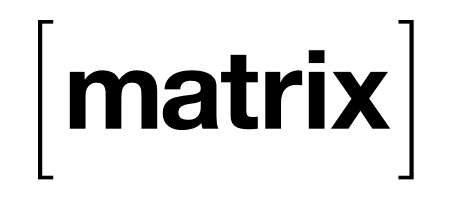
 RSS Feed
RSS Feed